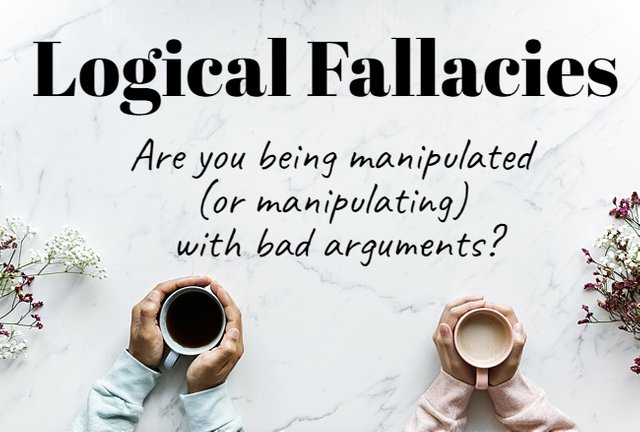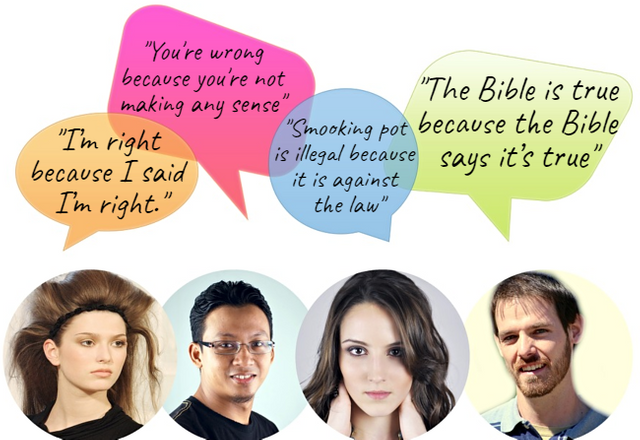Logical Fallacies - Are you being manipulated (or manipulating) with bad arguments?
This is the topic that makes me extremely happy to write about. Since this will be the post that I will enjoy writing more than I did others, it will be better than others too. Right? Wrong. That statement is a logical fallacy. Today, I will explain to you what critical thinking involves, how to properly engage in a debate, what is false reasoning and what are the ways people are manipulating each other with words on a daily basis. Fallacious arguments can seem convincing even though they are not and it can sometimes be pretty easy to fall for them. Do not do it.

CC0 image, Pixabay, author: rawpixel, adapred by me
"Being logical" is something anyone can do with some practice, it is not reserved simply for Spock and scientists. A logical fallacy is an error in reasoning. It is an argument that uses a false basis in an attempt to persuade someone. They are used to prove or promote ideas, views, and statements that are misleading or simply not true and the ability to spot them can be your "superpower" because it will help with your critical thinking. It can save your time, money, and a little thing called personal dignity. You will no longer be manipulated by everything you hear.
So many to choose from...
There are many fallacies and speaking correctly, objectively, logically and truthfully is more harder than you think. I will cover those fallacies that are most commonly used by politicians, tv commercials, fanatics, religious leaders, and people who want to convince you about something no matter the cost. Let's say that those that are in this post are those that I have heard being used the most. For more information, there will be a list of references at the end of the post.


This fallacy confuses correlation for causation. It mistakenly claims that one thing caused another to happen since they happened in sequence. People have a strong sense of causation and this is how most superstitions were born.
EXAMPLE: You were wearing a specific blue shirt while watching a football match and your team won, the logical fallacy would be to say: "Wearing my lucky blue shirt made my team to win". I assure you, that team has no idea you even exist let alone are impacted by your clothing preferences.
Just because something leads to some unfavorable or favorable result does not mean that it caused it. Walking under ladders or luck, in general, have no known or demonstrated causal power and are not scientifically reliable categories to be valid in any argument. Same goes for any misinterpretation on cause and effect relationship. Saying: "You did not pray so you will not get that job." is a logical fallacy. Your potential employer has no knowledge of your religious practice and will probably judge you solely on your resume and what you say during your interview.
If something makes you happy or more secure, do it. Having a four leaf clover in your wallet? Smiling at yourself in the mirror before you walk out of the house? All fine, just do not give those things credit for anything else than making you happy. Being happy is important, I always say that and stand behind that claim. Be careful to not mistaken your happy charms with lucky charms. You may say that it does not hurt to use lucky charms. I would argue that by attributing them with causality takes away your responsibility for the choices and actions you have made. You were good at something because you were prepared, focused, smart, resourceful and had knowledge about the subject. Give yourself some credit.


This logical fallacy is something that we all used when we got upset, yes, even you. Remember when you told your parents that everyone will hate you and you would have no friends if they do not let you stay out longer? It is a false causality taken to extremes. These kinds of arguments attempt to discredit a proposition by arguing that its acceptance or rejection will undoubtedly lead to a sequence of undesirable events while providing no evidence in support of that. It often plays with fears and lists a number of things as consequences.
EXAMPLE: "If we let gay people adopt children, we will soon let pedophiles adopt children and children will be put into homes where they will be abused which will lead to them being psychologically damaged and grow up to be crazy murderers and rapists." Sure, that makes sense but only in your paranoid head. The error in the slippery slope is that there are no common sense steps between the first and the last argument, no proven causation.
People value their opinions and often find them to be true while those from others are wrong. In their attempt to convince others of their views, they resort to exaggeration to get their point across. That exaggeration is the result of the anger of not being accepted as the one who is right by provoking fear in others with made-up scenarios that aim to shock the listener or reader. Provoking an emotional response often leads to agreeing so you should always stop and think about the potential manipulation of your provoked feelings.
Some causal chains are perfectly reasonable and possible. The cause and effect relationships between certain things do exist. The problem with the slippery slope is that it suggests unlikely or ridiculous outcomes with no proof. The perspective that one change inevitably leads to another with no evidence is a common way politicians and religious leaders are manipulating the masses.


You have probably heard that old saying how it is not about what is said but about who has said it. It is completely wrong with the promotion of ad hominem logical fallacy. The fallacy refers to an attack on the person advancing the argument, instead on the validity of the evidence or logic. It is often used by politicians all over the world and there is not a political campaign with it, at least not that I have seen lately. Ad hominems focus on personality issues, speech patterns, wardrobe, style, educational background, political views, sexual preferences, religion, skin color and many others. They are usually used when a person has no valid argument so the attack of the person is more easier than the attack on her views.
EXAMPLE: "Dr. Nick is cheating on his wife so you should not trust his medical advice", "You are not a parent, you can not know how to raise a child.", "All politicians are liars", "You don't have a college degree so you don't know enough to talk about that subject". Examples are plentiful and when it comes to politicians they do not only use these kinds of arguments when addressing their opponents but when dealing with the press too. Often when a politician does not like a question, doesn't understand it or lacks the answer, he attacks and insults the reporter who asked it trying to divert the attention from himself and using the logic "attack is the best defense".
Instead of providing good sound reasoning, ad hominems replace logical argumentation with attacks which are unrelated to the truth of the matter. Insults are used as if they were arguments or evidence in support of a certain conclusion with the aim to discredit the other person. Unfortunately, ad hominems are also used in courts during testimonies to question a person's character and integrity.
"Bad" people often make valid claims, and "good" people often make invalid claims. You should always separate the claim from the person making it. The validity of an argument has absolutely NOTHING to do with the character of the person presenting it. The truth is the truth no matter who says it. You not liking somebody is not the evidence for that person to be wrong about something.


Circular reasoning is repeating the same argument over and over again and it is often present in dogmatic thinkers. A conclusion is used as a premise. An argument only appears to be an argument while it is actually trying to prove itself by itself and nothing else.
EXAMPLES:

CC0 image, Pixabay, author: geralt, adapted by me
Circular reasoning is mostly used in religion and by parents who want their children to behave by claiming that something is right because they said so. An unwillingness to even consider the opponent’s argument is almost always present. Instead of discussing the actual issue there is an assertion that one’s position is so correct that one should not even examine the evidence to the contrary. People try to justify these arguments by giving examples of other circular statements such as "I do not have to explain myself, I am right because I am right just as this chair is red because it is red."
I find people who use these kinds of arguments the most difficult to talk to. Their sentences are meaningless and they have no evidence to back their claims. The problem with these arguments is that they may seem correct and are therefore sometimes tricky to recognize. The form of an argument is invalid but the statement sounds like it is normal and true. Saying that someone is the best because no one else is as good as him is, in fact, circular reasoning. That someone may be the best but that argument does absolutely nothing to prove it. The Bible might be true but the statement how it is true because it says it is true is not proving it. It is not a valid argument.
To recognize if something is circular reasoning, you need to recognize that the conclusion also appears as one of the premises in the argument. If the premise and the conclusion are the same (even with the use of different words) then the argument is a fallacy.


As I have mentioned before, presenting your views (spoken or written form) in a proper way is not as easy as you might think. We often make logical fallacies but with some practice, we can get better at it. There are many mistakes that we make when we lack the actual argument or evidence to support our claims so we use various misleading or untruthful statements. From defending ourselves by pointing to another, saying that something is right because the majority thinks so, introducing false dilemma or appealing to ignorance. The last two are pretty common.
The false dilemma is when we try to attack or discredit a person by presenting him with a biased choice that will undermine them. "Either you are for a total ban on pornography or you want your children to watch it" is a good example of false dilemma just as "You either support George Bush or you support the terrorists." is. It is a "black and white" way of thinking and by one idea being rejected, then another one has to be accepted.
When it comes to appealing to ignorance, an argument assumes a proposition to be true simply because there is no evidence proving that it is not. Ignorance isn't proof of anything except that a person doesn't know something. If it was not proven that something does not exist it does not mean that it does. When someone makes a claim it is up to them to produce evidence for it. It is always for the person making the positive statement to produce positive evidence because saying "Prove that it does not exist" only shows that an arguer is attempting to move the burden of proof from himself to his opponent because he lacks the proof himself.
Keep in mind that logical fallacies are often used as means of control over an individual or large groups of people. You have a brain for a reason, use it. When you are listening to someone (anyone), try to spot if the person is using fallacies and for what reason. One way or another, most people want your money. From tv commercials that want you to buy their product to politicians who want you to elect them and give them power, people will try to persuade you to trust them in various ways. Be smarter than that, do not get used and manipulated.


Now that I have more or less successfully explained what logical fallacies are and have given you examples, let's talk about how you can get better at recognizing them. Two things can help, deductive logic and comprehension skills with comprehension being more important than deduction. Yair Neuman of Ben-Gurion University studied high-school students' ability to identify fallacious arguments. He wanted to determine whether their ability to identify fallacious arguments was related to deductive logic ability and/or a specific aspect of reading comprehension. He examined 3 types of fallacious arguments:
- The false causality
- The appeal to popularity
- The appeal to ignorance
He measured their performance on detection of argument fallacies, deductive logic, and the inference process in reading comprehension. The findings were that comprehension was significantly related to spotting fallacies while deductive logic not so much. This suggests that if we are actively generating inferences when we read or listen, we are more likely to detect a gap. Making our own connections between everything that has been said by being attentive and following carefully enables us to recognize a bad move in someone's argument.
You can read the article here: Go ahead, prove that God does not exist! On high school students’ ability to deal with fallacious arguments by YairNeuman
Before ending the post and giving you some references, I have to suggest an amazing book to you. It is "An illustrated book of bad arguments" by Ali Almossawi that is in my humble opinion, simply briliant. You can check it out here: The book of bad arguments
If nothing else,
read that book!
Ok, in closing, you should think for yourself. That is kind of my main point here. Trust should never be blind. You are able to think (maybe you just have to try harder sometimes) and recognize when someone is trying to mislead or fool you. Logical fallacies can be both intentional and unintentional but in both cases, their use is not the correct way of communicating. They are false arguments that will not prove the point so be careful and try to focus on the words you hear or read. Follow the premises and logic, who knows what you may discover to be the actual truth.
To read more about this topic, check out these REFERENCES:
The book of bad arguments
Fallacies from writingcenter.unc.edu
15 Bad Arguments We All Abuse"> from listverse.com
Drake's List of The Most Common Logical Fallacies from uidaho.edu
15 Logical Fallacies You Should Know Before Getting Into a Debate from thebestschools.org
Spotting Fallacious Arguments from thinkeracademy.com

Until next time
KEEP YOUR SMILE ON
& THINK!



Image sources AND LICENCES in order of appearance:
- all images used in this post are free for commercial use, they are royalty free with the links to original images provided under them
- line divider that I use is from FREE CLIPART LIBRARY, and is here
- title pictures are made by me using the CC0 image from pixabay that can be found here
- my bitmoji avatar was created on https://www.bitmoji.com/, visit the site to create yourown
PROUD MEMBER OF:



@steemitbloggers







OK. First: In some instances if I think I CAN'T keep my smile on. Just sayin'
I LOVE the Book of Bad Arguments. A friend sent it to me a couple of years ago. Not only did we have great fun with it, but I've referred to it a few times since.
A healthy dose of skepticism is helpful to me in judging claims. I refuse to accept anything that is 'single source' which is problematic for those arguing religion.
Thanks for another terrific post my friend. I submit that you are really on a roll right now. Ahahahahaha
I am on roll because steem is down and I know how to exploit the situation to my benefit, you snooze you lose :) This is the best time for more work and more quality. I am glad you enjoyed the post and your support is very much appreciated honey! I will have to give that book a read when I finish with that one that Alex recommended me. Wow, so many books, so little time. When do people find the time to watch tv? :D
I love this post, and having been briefly involved with debating societies, it makes me think about how the most successful politicians (who practise the types of debating tricks where you learn how to support an argument that you may not actually believe in) operate.
I would in fact, argue that most successful politicians are liars. They have to be, in order to progress their careers. The ones who speak the truth stay on the backbenches.
I read a very interesting post from @luzcypher recently, which discusses the methods that are used to spread fake news. I looked up one of the sources in his post, about "the 25 rules of disinformation" – and it is so revealing. I don't think this is an actual rule sheet – it's more of a guide to how politicians and campaigners (and social media trolls) press their point in public, and how they aim to slay their opponents' arguments rather than adhering to logic or rationality.
Sadly, it often works!
It works because people are too lazy to think :) They blindly trust everything they hear or read. Thanks for the feedback, I am glad you enjoyed the read.
Yes, that is so true, sadly. They believe it especially if the person speaking wears a suit and has an authoritative voice.
This post has been voted on by the SteemSTEM curation team and voting trail in collaboration with @utopian-io and @curie.
If you appreciate the work we are doing then consider voting all three projects for witness by selecting stem.witness, utopian-io and curie!
For additional information please join us on the SteemSTEM discord and to get to know the rest of the community!
One day... When I become rich... famous... or a superhero... You guys will be in my memoirs 💚
In the case of George Bush, they are one in the same.
If they are the same then it is a circular fallacy :D But yeah, people often use exaggeration to prove their point when there is no actual evidence.
There is a funny book writen in our language by the guy who was IT enthusiast in the early 80's : "Are there things that don't exist?" download
My recomandations to all young people to sharp their skills in critical thinking
Thanks for the link, I went over through the chapters and I think it will be quite interesting to read.
Bloody brilliant!!!!!
😊🙏🏽☯️
hihihi, I am really happy that you think so! 💚
Oh crap I am so guilty of this...think it's called politics LOL!
Posted using Partiko Android
hahahaha, please stop manipulating people with words, thank you :D :D :D
Clearly laid out and well written, as always. You bring such thoughtful topics to light!
Thank you honey, that is very nice to hear 💚
Hi @zen-art!
Your post was upvoted by Utopian.io in cooperation with @steemstem - supporting knowledge, innovation and technological advancement on the Steem Blockchain.
Contribute to Open Source with utopian.io
Learn how to contribute on our website and join the new open source economy.
Want to chat? Join the Utopian Community on Discord https://discord.gg/h52nFrV
Thank you for your amazing support! 💚
I must write it in every wall of my city ""Being logical" is something anyone can do with some practice, it is not reserved simply for Spock and scientists." by the way i loved your post, it's really well written and the topic is interesting and well explained, can i tell you the truth? i wish i could make these post too, clear, neat, well written and with cool pictures, i must improve my steemit skills, thank you for the inspiration!